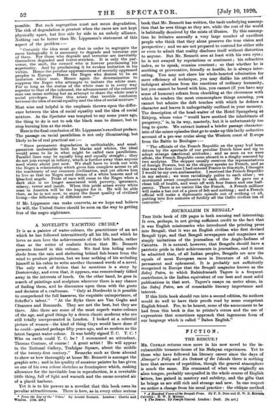A NOVELISTS YACHTING CRUISE.* IT is as a painter of
water-colours, the practitioner of an art which he has followed intermittently all his life, and which he loves as men love the achievements of their left hands, rather than as the writer of realistic fiction that Mr. Bennett presents himself in this volume. We find him hiding under sheds from the rain and sheltering behind fish-boxes from the wind to produce pictures, but we hear nothing of his secluding himself in his cabin to write another thousand words of a novel. The only work of fiction that he mentions is a story by Dostoievsky, and even that, it appears, was remorselessly tidied away in the interests of lunch. On the other hand, he goes in
search of paintings and sculpture wherever there is any chance of finding them, and he discourses upon them with the gusto and decision of a craftsman. "Only at Dordrecht is it possible to comprehend the full baseness, the exquisite unimportance, of Scheffer's talent." "At the Ryks there are Van Goghs and Cezannes and Bonnards. They are not the best, but they are there. Also there are some of the most superb water-colours of the age, and good things by a dozen classic moderns. who are still totally unrepresented in London. I looked at a celestial picture of women—the kind Of thing Guys would have done if he could—painted perhaps fifty years ago, and as modern as the latest Sargent water-colour. It was boldly signed T. C. T. C.? Who on earth could T. C. be ? I summoned an attendant. Thomas Couture, of course ! A great artist ! He will appear in the National Gallery, Trafalgar Square, about the middle of the twenty-first century." Remarks such as these abound to show us how thoroughly at home Mr. Bennett is amongst the graphic arts ; and in his quality of amateur painter he has given us one of his own colour sketches as frontispiece which, making allowance for the inevitable loss in reproduction, is a covetable little thing, full of light and warmth and the ozone-scented air of a placid harbour.
Yet it is to his powers as a novelist that this book owes its peculiar attractiveness. There is here, as in every other serious
• From the Log of the Vasa. By Arnold Bennett. London ghetto and WIndus. (18s. net.]
book that Mr. Bennett has written, the tacit underlying assump- tion that he sees things as they are, while the rest of the world is habitually deceived by the mists of illusion. By this assump- tion he irritates annually a very large number of excellent people who think that they alone preserve the true vision and perspective ; and we are not prepared to contend for either side or even to admit that reality discloses itself without distortion to anyone. But Mr. Bennett sees at least with his own eyes ; he is not swayed by reputations or sentiment ; his refractive index, so to speak, remains constant ; so that whether he is soothing or provocative, friendly or hostile, he is always inter- esting. You may not share his whole-hearted admiration for mere efficiency of technique, you may dislike his attitude of indulgent aloofness from the emotions of ordinary humanity, but you cannot be bored with him, you cannot (if you have any sense of humour) refrain from chuckling at the cleverness with which he renders the most commonplace things amusing, you
cannot but admire the deft touches with which he defines a character and leaves it unforgettably outlined in your. memory. The description of the head-waiter of the Hotel Spangsberg at Esbjerg, whose voice "would have soothed the inhabitants of purgatory," is, in its way, masterly, but it is unfortunately too long to quote. We extract instead a briefer passage character- istic of the minor episodes that go to make up this lazily seductive account of a pre-war cruise along the Western coast of Eirope from the Baltic to Boulogne :— " The officials of the French Republic on the quay had been driven by the spectacle of our peculiar Dutch lines and rig to adopt strange emotional attitudes and as soon as we were afloat, the French Republic came aboard in a dinghy manned by two acolyte& The skipper usually receives the representatives of foreign Powers, but as the skipper speaks no French, and as this was the first time I had entered France in this style, I thought I would be my own ambassador. I received the French Republic in my saloon ; we were ravishingly polite to each other ; we murmured sweet compliments to each other. He gave me a
clean bill of health, and went off with four francs and one half- penny. There is no nation like the French. A French milliner
will make a hat out of a piece of felt and nothing ; and a French official will make a diplomatic episode out of nothing it all, putting into five minutes of futility all the Gallic civilize ion of
centuries." -


































 Previous page
Previous page